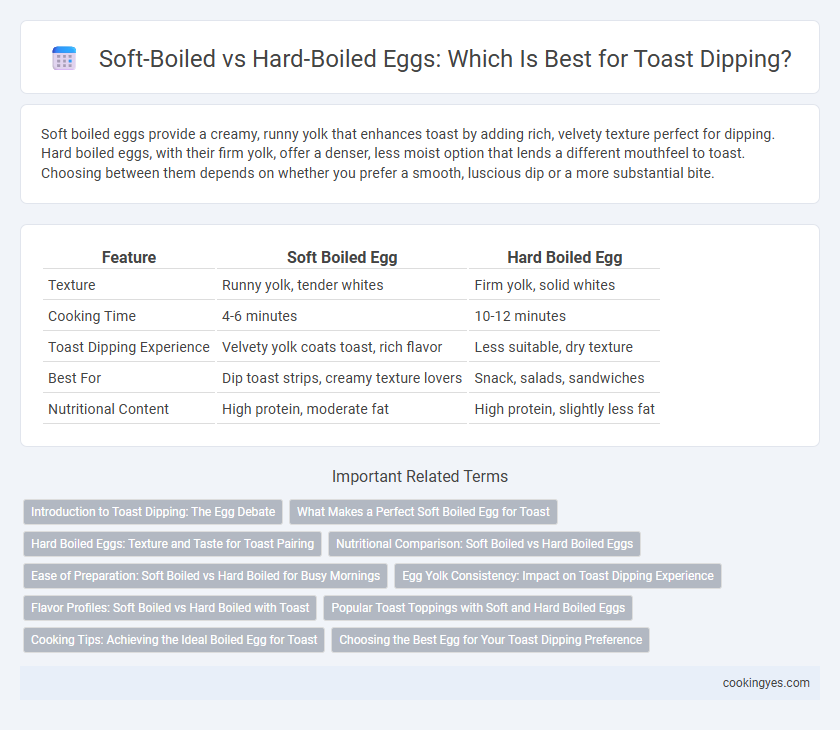Soft boiled eggs provide a creamy, runny yolk that enhances toast by adding rich, velvety texture perfect for dipping. Hard boiled eggs, with their firm yolk, offer a denser, less moist option that lends a different mouthfeel to toast. Choosing between them depends on whether you prefer a smooth, luscious dip or a more substantial bite.
Table of Comparison
| Feature | Soft Boiled Egg | Hard Boiled Egg |
|---|---|---|
| Texture | Runny yolk, tender whites | Firm yolk, solid whites |
| Cooking Time | 4-6 minutes | 10-12 minutes |
| Toast Dipping Experience | Velvety yolk coats toast, rich flavor | Less suitable, dry texture |
| Best For | Dip toast strips, creamy texture lovers | Snack, salads, sandwiches |
| Nutritional Content | High protein, moderate fat | High protein, slightly less fat |
Introduction to Toast Dipping: The Egg Debate
Soft boiled eggs boast a runny yolk that perfectly complements toast for a creamy, rich dipping experience, while hard boiled eggs offer a firmer texture that can be sliced or mashed for a more substantial topping. The choice between soft boiled and hard boiled eggs hinges on the desired texture and flavor intensity, with soft boiled eggs delivering a luscious dip and hard boiled eggs providing a satisfying chew. Toast dipping preferences often revolve around the balance between melt-in-your-mouth softness and a more robust, protein-packed option.
What Makes a Perfect Soft Boiled Egg for Toast
A perfect soft boiled egg for toast dipping features a delicately set white with a rich, runny yolk that creates a creamy texture ideal for soaking into warm bread. Achieving this requires precise timing, typically boiling the egg for 5 to 6 minutes, followed by immediate cooling in ice water to halt cooking and preserve the yolk's silkiness. Freshness of the egg also plays a crucial role, as fresher eggs hold their shape better and ensure a smooth, luscious dipping experience on toast.
Hard Boiled Eggs: Texture and Taste for Toast Pairing
Hard boiled eggs offer a firm texture that contrasts well with the crisp surface of toasted bread, making each bite satisfying and balanced. Their mild, slightly creamy flavor enhances the natural taste of toast without overpowering it, ideal for those who prefer subtler pairings. The ease of slicing and stability of hard boiled eggs also allows for neat layering on toast, contributing to a more structured and enjoyable eating experience.
Nutritional Comparison: Soft Boiled vs Hard Boiled Eggs
Soft boiled eggs contain slightly higher moisture content and retain more nutrients like vitamin B12 and folate compared to hard boiled eggs, making them a more bioavailable option for toast dipping. Hard boiled eggs have a denser texture and slightly higher protein concentration due to water loss during cooking. Both forms provide essential nutrients such as complete proteins, vitamin D, and choline, but soft boiled eggs offer better preservation of heat-sensitive vitamins.
Ease of Preparation: Soft Boiled vs Hard Boiled for Busy Mornings
Soft boiled eggs take about 4-6 minutes to prepare, offering a quick and gooey option for toast dipping that suits busy mornings. Hard boiled eggs require 9-12 minutes plus cooling time, making them less ideal for fast preparation. For those prioritizing speed and ease, soft boiled eggs provide a time-efficient, flavorful complement to toast without extensive waiting.
Egg Yolk Consistency: Impact on Toast Dipping Experience
Soft boiled eggs have a runny yolk that creates a rich, creamy texture ideal for dipping toast, enhancing flavor absorption and providing a luxurious mouthfeel. Hard boiled eggs feature a fully set yolk that offers a firmer texture, which can make dipping less smooth and less flavorful. The yolk consistency directly influences the toast dipping experience, with soft yolks delivering a more moist and enjoyable interaction compared to the dry, crumbly nature of hard yolks.
Flavor Profiles: Soft Boiled vs Hard Boiled with Toast
Soft boiled eggs paired with toast offer a creamy, rich yolk that blends seamlessly with the crunch of toasted bread, enhancing the overall flavor experience. Hard boiled eggs provide a firmer texture and a more subdued taste, creating a contrast that highlights the toast's crispness without overwhelming it. Choosing soft boiled eggs accentuates velvety yolk notes, while hard boiled eggs emphasize a balanced, mild egg flavor perfect for simpler toast pairings.
Popular Toast Toppings with Soft and Hard Boiled Eggs
Soft boiled eggs, with their runny yolks, create a creamy texture that perfectly complements crunchy toast, making them a popular choice for dipping. Hard boiled eggs offer a firmer texture and are often sliced or mashed, pairing well with spreads like avocado or hummus for toast toppings. Both egg types provide rich protein and versatility, enhancing the flavor profile of various gourmet toast recipes.
Cooking Tips: Achieving the Ideal Boiled Egg for Toast
For perfect toast dipping, soft boiled eggs should be cooked for 4 to 6 minutes to achieve a runny yolk, while hard boiled eggs require 9 to 12 minutes for a fully set center. Using an ice bath immediately after boiling stops the cooking process and prevents overcooking. Peeling the eggs gently under running water ensures a smooth shell removal, enhancing the texture for an ideal toast dipping experience.
Choosing the Best Egg for Your Toast Dipping Preference
Soft boiled eggs offer a creamy, runny yolk that perfectly complements toast for dipping, creating a rich texture and enhanced flavor experience. Hard boiled eggs provide a firmer yolk and white, ideal for those who prefer a more structured bite without the messiness of a runny yolk. Selecting the best egg depends on whether you prioritize a smooth, luscious dip or a more solid, convenient option for your toast.
Soft Boiled Egg vs Hard Boiled Egg for Toast Dipping Infographic

 cookingyes.com
cookingyes.com